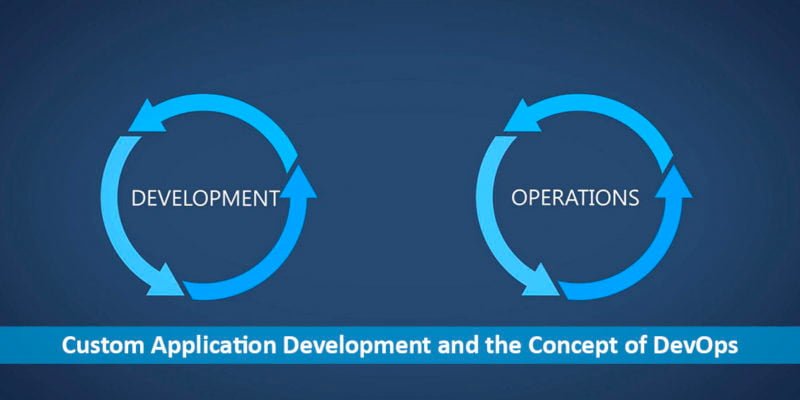Custom Application Development and the Concept of DevOps

Custom application development is the cornerstone for businesses seeking to create tailored solutions that meet their specific needs. However, the complexity and evolving nature of technology demand more efficient development processes. This is where DevOps plays a transformative role. By combining development (Dev) and operations (Ops) into a unified framework, DevOps helps organizations streamline workflows, enhance collaboration, and achieve rapid application deployment.
In this blog, we’ll dive deep into how DevOps practices can drive success in custom application development and how businesses can leverage these strategies to build high-performing applications.
The Role of DevOps in Application Development
What is DevOps and Why is it Essential?
Key DevOps Practices for Custom Application Development Success
1. Continuous Integration (CI) and Continuous Deployment (CD)
One of the most critical DevOps practices is Continuous Integration (CI), which involves the regular merging of code changes into a shared repository. This process helps detect and resolve conflicts early, improving the overall code quality.
Continuous Deployment (CD) takes this one step further by automating the deployment of applications. With CD, any change that passes automated testing is immediately released into production. This means businesses can deploy new features, patches, or updates quickly and efficiently, without downtime.
2. Infrastructure as Code (IaC)
Managing infrastructure manually can be time-consuming and error-prone, especially as custom applications scale. DevOps introduces Infrastructure as Code (IaC), a practice that allows infrastructure to be managed and provisioned through code, making the entire process repeatable, scalable, and less prone to human error.
With IaC, businesses can automate the configuration of servers, networks, databases, and more, ensuring that environments are consistently deployed and easy to manage.
3. Automation in Testing and Deployment
Automation is the backbone of DevOps, and custom application development benefits significantly from automating repetitive tasks. From running unit tests to deploying applications across multiple environments, automation reduces manual labor, minimizes errors, and speeds up the development lifecycle.
By automating testing, for instance, development teams can catch bugs early and release stable applications faster. Automated deployment ensures that applications are launched smoothly and consistently, reducing the risk of post-deployment issues.
4. Enhancing Collaboration Between Development and Operations
One of the fundamental principles of DevOps is improving collaboration between development and operations teams. In traditional development models, these teams often work in silos, leading to miscommunication, delays, and errors. With DevOps, collaboration is at the forefront, as both teams work together from the outset of the project.
This cross-functional approach fosters a culture of shared responsibility, where both development and operations teams align their objectives and work together to meet the same business goals. This significantly reduces friction in the development process, helping teams address issues proactively rather than reactively.
5. Improving Speed and Efficiency Through Automation
Automation is critical to accelerating application development. By automating key stages of the development pipeline, including testing, integration, and deployment, businesses can significantly increase the speed and efficiency of their processes.
For example, rather than manually deploying new code to production environments, DevOps practices enable automatic deployments through pre-configured scripts. This not only saves time but ensures consistency across environments, improving the overall stability and reliability of the application.
6. Achieving Scalability and Flexibility in Application Development
As custom applications grow in size and complexity, the need for scalable infrastructure becomes paramount. DevOps enables scalability through automation and IaC practices, allowing businesses to scale their applications effortlessly to meet growing user demands.
By leveraging cloud infrastructure, DevOps practices ensure that applications can scale dynamically, providing flexibility in resource allocation. This ensures that your custom applications remain responsive and functional, even as your business and customer base grow.
7. Security and Compliance in DevOps (DevSecOps)
DevSecOps is the integration of security practices within the DevOps framework. In the world of custom application development, ensuring security is critical, especially when handling sensitive customer data or complying with industry regulations.
By incorporating security checks and compliance protocols early in the development pipeline, DevSecOps ensures that security vulnerabilities are identified and addressed before they reach production. This reduces the risk of security breaches and ensures that your applications remain compliant with relevant regulations, such as GDPR or HIPAA.
8. Monitoring and Continuous Feedback for Improvement
A key aspect of DevOps is the emphasis on continuous monitoring and feedback. After deploying custom applications, businesses need real-time insights into their performance to identify bottlenecks, optimize processes, and ensure reliability.
Through continuous monitoring, teams can receive feedback on various metrics, such as application response times, server health, and user behavior. This allows them to make data-driven decisions and apply improvements continuously, ensuring that applications run optimally even after launch.
Challenges in Implementing DevOps for Custom Development
Cultural Resistance
Tool Integration
Skill Gaps
Best Practices for DevOps-Driven Custom Application Development
Start Small, Scale Gradually
Invest in Automation
Focus on Collaboration
Future Trends: The Evolving Role of DevOps in Custom Development
AI-Driven Automation
Microservices and Containerization
Containerization and DevOps
Containerization, a core DevOps trend, is revolutionizing how custom applications are built and deployed. Containers package software in a way that includes everything needed to run it—code, runtime, libraries, and system tools—making it possible to move applications seamlessly across different environments.
This trend will continue to grow as container orchestration platforms like Kubernetes allow for greater flexibility, scalability, and reliability. With DevOps and containers, teams can ensure that applications behave consistently regardless of where they are deployed, whether on-premise, in the cloud, or in hybrid environments.
Serverless Computing
Conclusion: Achieving Sustainable Success with DevOps
In conclusion, integrating DevOps into custom application development is key to achieving sustainable success. By fostering collaboration, automating processes, and ensuring scalability, DevOps empowers businesses to develop high-quality custom applications that meet the needs of their customers and adapt to future demands.
Ready to transform your application development process with DevOps? Contact us for a free consultation and learn how our DevOps experts can help you succeed in your custom development journey.

President & CEO – Growth Markets




